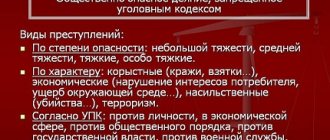Punishment concept
Punishment is a measure of state coercion, imposed by a court verdict. Punishment is applied to a person found guilty of committing a crime and consists of the deprivation or restriction of the rights and freedoms of this person provided for by this Code (Part 1 of Article 43 of the Criminal Code of the Russian Federation).
Punishment is a logical consequence of a citizen’s violation of a criminal law prohibition, which gives rise to a conflictual attitude and the need for its resolution by society and the state.
Signs of punishment
The main signs of punishment are:
1. This measure of state coercion, i.e. Punishment is the legal consequence of committing a crime.
2. Applies to a person found guilty of a crime, i.e. for actions (inactions) that are provided for by criminal law as a crime.
3. Punishment is personal in nature and is always directed against the perpetrator of the crime and under no circumstances can it be transferred to other persons.
4. Punishment is imposed by a court verdict and on behalf of the state.
5. Punishment entails a special legal consequence - a criminal record, which can be expunged or removed in accordance with Art. 86 of the Criminal Code of the Russian Federation.
6. Punishment is associated with the deprivation and restriction of the rights and freedoms of a person found guilty, deprives him of certain benefits and causes him moral suffering.
These features distinguish criminal punishment from other measures of state coercion (administrative, disciplinary, etc.).
Concept, essence and signs of criminal punishment
When considering the institution of punishment, it is necessary to pay special attention to the modern interpretation of this concept, adopted not only in legislation, but also in the scientific community, as well as the goals of punishment that are currently postulated in our country.
The very concept of “criminal punishment” is quite complex, multi-component and versatile, both in its everyday and scientific understanding. Therefore, various scientists put very different meanings and contents into this category: punishment is interpreted as a coercive influence, as a forced evil, a threat; restoration of violated rights; as intimidation, as psychological coercion; as censure, correction, re-education, etc.
This confusion is caused by the fact that punishment has been used by humanity for a very long time. During this time, scientists have accumulated and substantiated many theories of punishment [4, p. 91].
In the most general sense, punishment is not only a special and very important legal institution, but also a special punitive activity of the state, designed to protect public order and relations from attacks [3, p. 129].
This is the most common public legal form of implementation of criminal liability in the form of the court applying measures of state coercion, the essence of which boils down to punishment and consists in condemning and censure of the guilty person and what he has done, in limiting or depriving his rights and freedoms in order to restore social justice.
Correcting the convicted person and preventing the commission of new crimes is also considered very important.
As for the essence of punishment, among thinkers and civil scientists there is no clear answer to the question of what exactly it is. However, understanding the essence of punishment in criminal law is extremely important, since this essence determines the very problem of combating crime, and also largely characterizes the attitude of society towards a person who has committed a crime.
In particular, some scientists (N.A. Belyaev, M.D. Shargorodsky [12, p. 82]) believe that this is punishment, while other researchers (for example, I.S. Noy [10, p. 89 ]) believe that punishment has a punitive-educational nature and combines persuasion and coercion. At the same time, punishment is one of the properties of punishment, but is not exhausted by it.
We can say that in the modern law of our country, punishment is one of the special criminal legal measures, as well as the most important criminal legal consequence of any crime.
Moreover, these consequences can have not only a real, but also a conditional character.
At the same time, in addition to punishment, the regulatory legal acts of our country also contain other, quite versatile measures of a criminal legal nature.
However, due to the actual absence in the definition of the concept of punishment of a list of measures that relate to it, this actually removes the line between punishment and other measures of a criminal legal nature.
As it was found out, there is no clear and unambiguous interpretation of the concept of “punishment” in the criminal law of our country. As a rule, most theorists and practitioners, when determining punishment, use the wording that is reflected in the current criminal legislation.
If we consider this interpretation more substantively, this will allow us to identify from it several essential features that form this concept:
Firstly, punishment is a special measure of state coercion. This measure is used to encourage a person who has caused any harm to society to behave in the law-abiding and socially approved manner expected of him.
The means by which this behavior is achieved can be very different. However, in the modern world, criminal punishment is considered in society the most severe and severe measure of public coercion [11, p. 112].
Consequently, the specificity and most important feature of criminal punishment is manifested in the fact that it is applied only if a particular person has committed a crime, that is, a criminally reprehensible act enshrined in criminal law. This is directly stated in Part 1 of Art. 3, part 1 art. 14 of the Criminal Code of our country [9, p. 209].
Also an important feature of criminal punishment is that state violence is applied to the offender, which represents a significant limitation on the capabilities of his person.
In particular, Art. 43 of the Criminal Code of the Russian Federation (if we consider it from the point of view of punishment), this restriction represents a deprivation or restriction of rights and freedoms. Such a restriction is necessary in order to minimize the moral and physical resistance to punishment of the person to whom it is applied, as well as to deprive him of the social status he was accustomed to, which he previously had. All this causes suffering to a person, which is a consequence of legal violence. However, when applying this or that punishment, it is important to realize that different people tolerate certain types of deprivation differently [2, p. 27].
Criminal legal violence, which is one of the signs of punishment, is always the result of coercion. This “legalized violence” changes the specifics of the relationship between the criminal and the victim, depriving the former of rights and status, and thereby compensating the latter for moral damage. Consequently, criminal legal violence is the response of society (and the authorities, as its representative) to crime. The measure and extent of this response is enshrined in criminal law [8, p. 102].
Returning to the features of punishment contained in its legislative interpretation, it should be noted that it represents a measure of state coercion.
Therefore, the imposition of punishment is legal only when there is a corresponding court order issued on behalf of the state.
This fact, first of all, predetermines the public nature of punishment, and also establishes the principle according to which punishment is applied exclusively on the basis of current legislation. And only in relation to a person who was found guilty by the authorized bodies of committing a particular crime, as evidenced by Part 1 of Art. 49 of the Constitution of the Russian Federation [1].
If no verdict is passed, the person is considered innocent.
Consequently, it is the issuance of an appropriate judicial verdict that allows the state, authorities and society to express an official negative assessment (censure) of the crime committed and the person who committed it, as well as to formalize it.
In addition, punishment, as a special measure of state coercion, has a special content, as well as the scope of coercive influence. Such features also characterize this criminal law institution and make it possible to distinguish punishment from other types of legal liability (in particular, administrative or civil liability).
Also different from punishment is its personal focus (against the convicted person), and also the fact that it cannot be applied to uninvolved persons.
In addition, the difference between punishment and other measures of influence is also its objective content: punishment (it is always punishment for any unlawful act) [7, p. 206].
At the same time, the concept of “state coercion” does not mean that the legislator does not attach due importance to punishment as an integral feature of punishment: no other coercive measure of influence is formed by punishment [5, p. 112].
Consequently, punishment is an integral sign of deprivation or physical restriction of any rights and freedoms of a person who has committed a crime and is found guilty. The objects at which punishment is directed become characteristics that are extremely necessary for a particular person - life, freedom, property, dignity, honor, position in society [6].
An important element of punishment is the moral suffering experienced by the criminal - shame, remorse, remorse. They help prevent future crimes in many ways.
The scope of the punitive properties of punishment, which depends on its type and the size of the restrictions on rights used, must be correlated with the severity of the crime. It is also mandatory to take into account the personal characteristics of the criminal, as well as the motives for his actions. All these factors must be taken into account by the legislator when a particular punishment is imposed on the guilty person. Consequently, it is punishment that allows punishment to prevent the commission of crimes.
Classification of punishments
In criminal legislation (Article 45 of the Criminal Code of the Russian Federation), according to the order of imposition of punishment, punishments are classified into those applied only as basic ones, applied only as additional ones and mixed ones, i.e. used as both basic and additional.
The main punishments include: compulsory labor; correctional work; restriction on military service; restriction of freedom; arrest; detention in a disciplinary military unit; imprisonment for a certain period of time; life imprisonment; the death penalty. The main types of punishments are assigned only independently; they cannot be added to other main punishments. They are always indicated in the sanctions of articles of the Special Part of the Criminal Code of the Russian Federation. But in the presence of exceptional circumstances, the court has the right to assign a different (but only milder) type of main punishment than that provided for in a specific article of the Special Part of the Criminal Code of the Russian Federation (Part 1 of Article 64 of the Criminal Code of the Russian Federation). When assigning a punishment, additional punishments may be added to the main one, including those not specified in the sanction articles. The institution of early release from serving a sentence (conditional early release from serving a sentence, release from serving a sentence due to illness, replacing the unserved part of a sentence with a milder type of punishment) applies only to punishments assigned as main ones (but it is possible to release from serving and additional punishment).
Additional punishments include only one type - deprivation of a special, military or honorary title, class rank and state awards. Additional punishment cannot be applied independently, without combination with the main ones. The peculiarity of this type of punishment is that it can only be applied for serious and especially serious crimes and its purpose depends only on judicial discretion (this type of punishment is not contained in the sanctions of the articles).
To mixed punishments, i.e. Punishments that can be imposed both as primary and as additional include: fine; deprivation of the right to hold certain positions or engage in certain activities. A fine as either a primary or additional punishment can be imposed only in cases specifically provided for by the relevant articles of the Special Part of the Criminal Code of the Russian Federation. Only in the same cases can a large fine (from 0.5 million rubles) be imposed for grave and especially grave crimes. To impose a punishment in the form of deprivation of the right to hold certain positions or engage in certain activities, it matters whether it is applied as a main one (sanction - from one year to five years) or additional (from six months to three years). Punishment in the form of deprivation of the right to hold certain positions or engage in certain activities may be imposed as an additional punishment in cases where it is not provided for in the relevant article of the Special Part of the Criminal Code of the Russian Federation (Part 3 of Article 47 of the Criminal Code of the Russian Federation). In the articles of the Special Part of the Criminal Code of the Russian Federation, the use of mixed punishments in combination with the main ones can be either mandatory (Part 3 of Article 286 of the Criminal Code of the Russian Federation) or optional (Part 2 of Article 286 of the Criminal Code of the Russian Federation). As stated in paragraph 39 of the Resolution of the Plenum of the Supreme Court of the Russian Federation of January 11, 2007 No. 2 “On the practice of imposing criminal punishment by the courts of the Russian Federation,” when imposing punishment under articles of the criminal law that provide for the possibility of applying additional punishment at the discretion of the court, the sentence should indicate the reasons for its use with relevant motives.
In the Dictionary of Synonyms
(corporal, strict, light, correctional, criminal); punishment, punishment, repression, execution, reprisal; penalty, fine, penance, reprimand, retribution, retribution, measure (severity) of the offense; washing, lotion, disgrace, cutting, nemesis, spanking, warning, gouge, dark, talion, reprisal, hara-kiri, shmas, reprimand, infusion, nemesis, fining, raking, cataplexy, penance, curse, shaking, brainwashing, pinching, blowing , curse, scourge, scolding, sanction, axe-head, article, bastonade, exile, decimation, punishment, Egyptian execution. Ant. reward, reward









